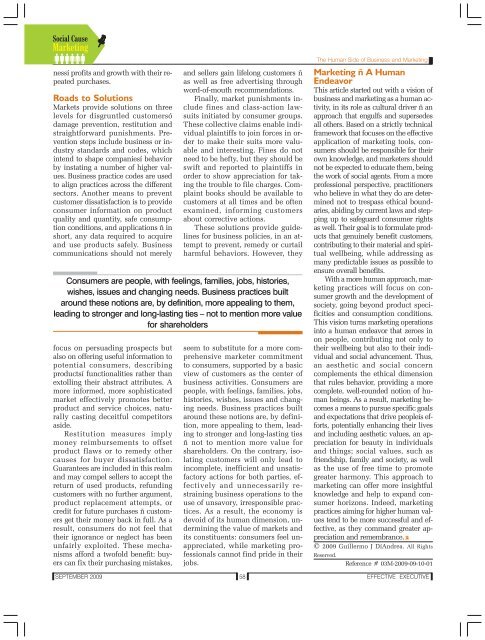Social Cause Marketing - The Regis Group Inc
Social Cause Marketing - The Regis Group Inc
Social Cause Marketing - The Regis Group Inc
Create successful ePaper yourself
Turn your PDF publications into a flip-book with our unique Google optimized e-Paper software.
nessí profits and growth with their repeated<br />
purchases.<br />
Roads to Solutions<br />
Markets provide solutions on three<br />
levels for disgruntled customersó<br />
damage prevention, restitution and<br />
straightforward punishments. Prevention<br />
steps include business or industry<br />
standards and codes, which<br />
intend to shape companiesí behavior<br />
by instating a number of higher values.<br />
Business practice codes are used<br />
to align practices across the different<br />
sectors. Another means to prevent<br />
customer dissatisfaction is to provide<br />
consumer information on product<br />
quality and quantity, safe consumption<br />
conditions, and applications ñ in<br />
short, any data required to acquire<br />
and use products safely. Business<br />
communications should not merely<br />
Consumers are people, with feelings, families, jobs, histories,<br />
wishes, issues and changing needs. Business practices built<br />
around these notions are, by definition, more appealing to them,<br />
leading to stronger and long-lasting ties – not to mention more value<br />
for shareholders<br />
focus on persuading prospects but<br />
also on offering useful information to<br />
potential consumers, describing<br />
productsí functionalities rather than<br />
extolling their abstract attributes. A<br />
more informed, more sophisticated<br />
market effectively promotes better<br />
product and service choices, naturally<br />
casting deceitful competitors<br />
aside.<br />
Restitution measures imply<br />
money reimbursements to offset<br />
product flaws or to remedy other<br />
causes for buyer dissatisfaction.<br />
Guarantees are included in this realm<br />
and may compel sellers to accept the<br />
return of used products, refunding<br />
customers with no further argument,<br />
product replacement attempts, or<br />
credit for future purchases ñ customers<br />
get their money back in full. As a<br />
result, consumers do not feel that<br />
their ignorance or neglect has been<br />
unfairly exploited. <strong>The</strong>se mechanisms<br />
afford a twofold benefit: buyers<br />
can fix their purchasing mistakes,<br />
and sellers gain lifelong customers ñ<br />
as well as free advertising through<br />
word-of-mouth recommendations.<br />
Finally, market punishments include<br />
fines and class-action lawsuits<br />
initiated by consumer groups.<br />
<strong>The</strong>se collective claims enable individual<br />
plaintiffs to join forces in order<br />
to make their suits more valuable<br />
and interesting. Fines do not<br />
need to be hefty, but they should be<br />
swift and reported to plaintiffs in<br />
order to show appreciation for taking<br />
the trouble to file charges. Complaint<br />
books should be available to<br />
customers at all times and be often<br />
examined, informing customers<br />
about corrective actions.<br />
<strong>The</strong>se solutions provide guidelines<br />
for business policies, in an attempt<br />
to prevent, remedy or curtail<br />
harmful behaviors. However, they<br />
seem to substitute for a more comprehensive<br />
marketer commitment<br />
to consumers, supported by a basic<br />
view of customers as the center of<br />
business activities. Consumers are<br />
people, with feelings, families, jobs,<br />
histories, wishes, issues and changing<br />
needs. Business practices built<br />
around these notions are, by definition,<br />
more appealing to them, leading<br />
to stronger and long-lasting ties<br />
ñ not to mention more value for<br />
shareholders. On the contrary, isolating<br />
customers will only lead to<br />
incomplete, inefficient and unsatisfactory<br />
actions for both parties, effectively<br />
and unnecessarily restraining<br />
business operations to the<br />
use of unsavory, irresponsible practices.<br />
As a result, the economy is<br />
devoid of its human dimension, undermining<br />
the value of markets and<br />
its constituents: consumers feel unappreciated,<br />
while marketing professionals<br />
cannot find pride in their<br />
jobs.<br />
<strong>The</strong> Human Side of Business and <strong>Marketing</strong><br />
<strong>Marketing</strong> ñ A Human<br />
Endeavor<br />
This article started out with a vision of<br />
business and marketing as a human activity,<br />
in its role as cultural driver ñ an<br />
approach that engulfs and supersedes<br />
all others. Based on a strictly technical<br />
framework that focuses on the effective<br />
application of marketing tools, consumers<br />
should be responsible for their<br />
own knowledge, and marketers should<br />
not be expected to educate them, being<br />
the work of social agents. From a more<br />
professional perspective, practitioners<br />
who believe in what they do are determined<br />
not to trespass ethical boundaries,<br />
abiding by current laws and stepping<br />
up to safeguard consumer rights<br />
as well. <strong>The</strong>ir goal is to formulate products<br />
that genuinely benefit customers,<br />
contributing to their material and spiritual<br />
wellbeing, while addressing as<br />
many predictable issues as possible to<br />
ensure overall benefits.<br />
With a more human approach, marketing<br />
practices will focus on consumer<br />
growth and the development of<br />
society, going beyond product specificities<br />
and consumption conditions.<br />
This vision turns marketing operations<br />
into a human endeavor that zeroes in<br />
on people, contributing not only to<br />
their wellbeing but also to their individual<br />
and social advancement. Thus,<br />
an aesthetic and social concern<br />
complements the ethical dimension<br />
that rules behavior, providing a more<br />
complete, well-rounded notion of human<br />
beings. As a result, marketing becomes<br />
a means to pursue specific goals<br />
and expectations that drive peopleís efforts,<br />
potentially enhancing their lives<br />
and including aesthetic values, an appreciation<br />
for beauty in individuals<br />
and things; social values, such as<br />
friendship, family and society, as well<br />
as the use of free time to promote<br />
greater harmony. This approach to<br />
marketing can offer more insightful<br />
knowledge and help to expand consumer<br />
horizons. Indeed, marketing<br />
practices aiming for higher human values<br />
tend to be more successful and effective,<br />
as they command greater appreciation<br />
and remembrance.<br />
© 2009 Guillermo J DíAndrea. All Rights<br />
Reserved.<br />
Reference # 03M-2009-09-10-01<br />
SEPTEMBER 2009<br />
58<br />
EFFECTIVE EXECUTIVE








